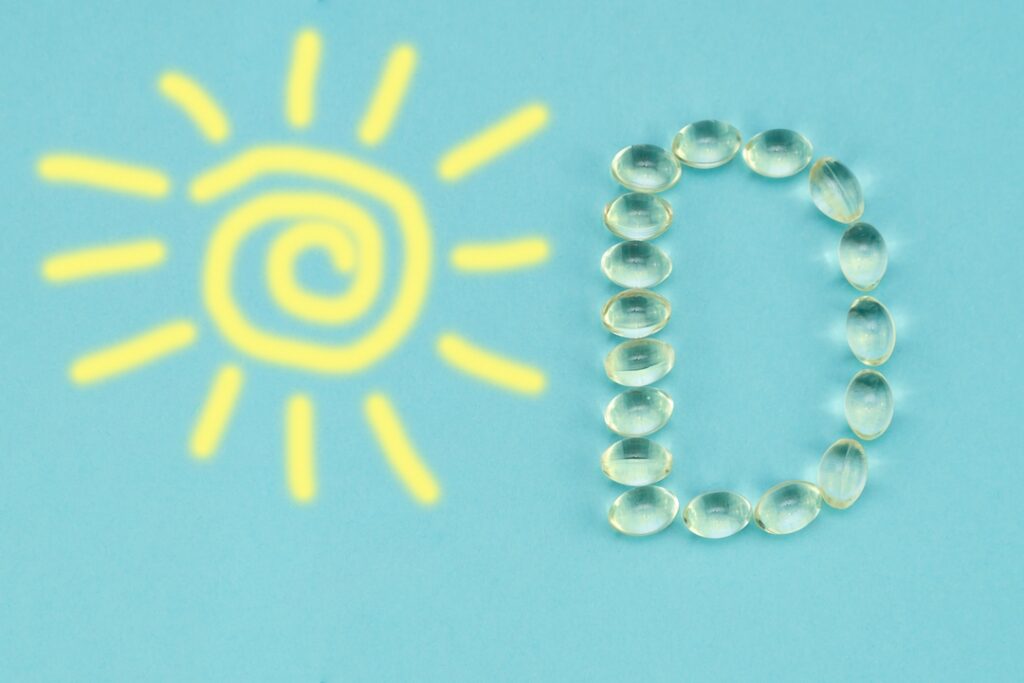Vitamin D, often referred to as the “sunshine vitamin,” plays a crucial role in our overall health and well-being. While it’s widely known for its importance in bone health, recent research has shed light on its significant impact on mood regulation and immune function. In this exploration of vitamin D, we’ll delve into how this essential nutrient affects our mental health and our body’s defense mechanisms, and discuss ways to ensure we’re getting enough of it.
Understanding Vitamin D: More Than Just a Vitamin
Vitamin D is unique among vitamins because our bodies can produce it when our skin is exposed to sunlight. This process is so efficient that it’s estimated we can get up to 90% of our vitamin D needs from sunlight exposure alone. However, factors such as geographical location, time of year, and lifestyle choices can significantly impact our ability to produce sufficient vitamin D. This is where dietary sources and supplements come into play.
For those looking to boost their vitamin D intake, super wellness gummies can be a convenient option, especially during seasons with limited sunlight.
Vitamin D and Mood Regulation
The link between vitamin D and mood is becoming increasingly clear. Numerous studies have found a correlation between low vitamin D levels and an increased risk of depression. This connection is thought to be due to vitamin D’s role in the production of serotonin, often called the “happy hormone.” Serotonin is a neurotransmitter that helps regulate mood, and low levels are associated with depression and anxiety. By supporting serotonin production, vitamin D may help maintain a more stable and positive mood.
Moreover, vitamin D receptors have been found in areas of the brain associated with depression. This suggests that vitamin D may have a direct impact on brain function and mood regulation. Some researchers even propose that vitamin D supplementation could be a potential treatment for seasonal affective disorder (SAD), a type of depression that’s related to changes in seasons, typically occurring in winter months when sunlight exposure is limited.
Vitamin D and Immune Function
The role of vitamin D in supporting our immune system is multifaceted and crucial. Vitamin D helps in the activation of T cells, which are a type of white blood cell that plays a central role in our body’s immune response. These T cells detect and destroy foreign pathogens in our body. Without sufficient vitamin D, these cells may not activate properly, potentially leaving us more susceptible to infections and diseases.
Furthermore, vitamin D has been shown to have anti-inflammatory properties. Chronic inflammation is linked to numerous health issues, including autoimmune diseases and certain types of cancer. By helping to regulate and reduce inflammation, vitamin D may play a role in preventing or managing these conditions. Recent studies have also suggested that vitamin D might play a role in reducing the severity of respiratory infections, including those caused by viruses. This has led to increased interest in vitamin D’s potential role in supporting immune function during the ongoing global health challenges.
For those interested in learning more about supporting their immune system, check out these tips on boosting your immunity in 3 simple steps.
Sources of Vitamin D
While sunlight is the most efficient source of vitamin D, it’s not always possible or safe to rely solely on sun exposure. Dietary sources of vitamin D include fatty fish (such as salmon and mackerel), egg yolks, and fortified foods like milk and cereal. However, it can be challenging to get enough vitamin D through diet alone, especially for those following a vegetarian or vegan diet.
This is where supplements can play a crucial role.
Vitamin D supplements are available in two forms: D2 (ergocalciferol) and D3 (cholecalciferol). D3 is generally considered more effective at raising blood levels of vitamin D. When considering supplements, it’s important to consult with a healthcare provider to determine the right dosage for your individual needs.
The Risks of Vitamin D Deficiency
Vitamin D deficiency is surprisingly common, especially in regions with limited sunlight or among people who spend most of their time indoors. The symptoms of deficiency can be subtle and easily overlooked. They may include fatigue, bone pain, muscle weakness, and increased susceptibility to infections. In severe cases, vitamin D deficiency can lead to osteoporosis in adults and rickets in children.
Certain groups are at higher risk of vitamin D deficiency, including older adults, people with darker skin, those who are obese, and individuals with conditions that affect fat absorption. If you fall into any of these categories, or if you’re concerned about your vitamin D levels, it’s worth discussing with your healthcare provider about getting your levels tested.
Balancing Sun Exposure and Skin Health
While sunlight is an excellent source of vitamin D, it’s important to balance the benefits with the risks of excessive sun exposure. The amount of time needed to produce sufficient vitamin D varies depending on factors such as skin tone, time of day, season, and geographical location. Generally, short periods of sun exposure (around 10-30 minutes a few times a week) are thought to be sufficient for most people. However, it’s crucial to avoid sunburn, which increases the risk of skin cancer.
For those concerned about sun damage, there are ways to support skin health from the inside out. Certain nutrients can help protect and nourish the skin. For more information on this topic, you might find this article on foods to keep you smiling helpful, as many foods that support oral health also benefit skin health.
Conclusion: Embracing the Sunshine Vitamin
The importance of vitamin D in boosting mood and immunity cannot be overstated. From supporting our mental health to strengthening our body’s defenses, this nutrient plays a vital role in our overall well-being. While getting enough vitamin D can be challenging, especially in certain climates or lifestyles, awareness of its importance is the first step towards ensuring we meet our needs.
Remember, a holistic approach to health is always best. While focusing on vitamin D is important, it’s just one piece of the puzzle. A balanced diet, regular exercise, adequate sleep, and stress management all contribute to mood regulation and a strong immune system. By taking care of our vitamin D levels alongside these other aspects of health, we can support our bodies and minds in staying resilient and vibrant.
For those looking to learn more about overall wellness and nutrition, you might find this guide on waist-trimming foods for your shopping lists informative and helpful in creating a well-rounded, nutrient-rich diet. Remember, small steps towards better nutrition and health can lead to significant improvements in your overall well-being. Embrace the power of the sunshine vitamin and feel the difference it can make in your life!





